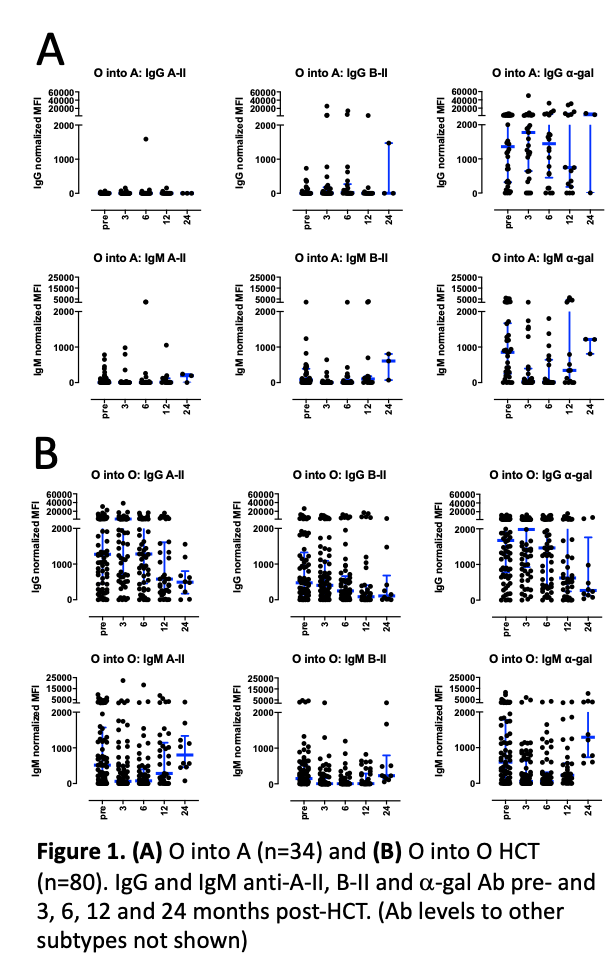ABH Subtype-Specific Tolerance after ABO-Mismatched Hematopoietic Cell Transplantation
1Alberta Transplant Institute, University of Alberta, Edmonton, AB, Canada, 2British Columbia Children’s Hospital Research Institute, University of British Columbia, Vancouver, BC, Canada, 3CancerCare Manitoba, University of Manitoba, Winnipeg, MB, Canada
Meeting: 2020 American Transplant Congress
Abstract number: B-383
Keywords: Bone marrow transplantation, IgG, Infant, Pediatric
Session Information
Session Name: Poster Session B: Tolerance / Immune Deviation
Session Type: Poster Session
Date: Saturday, May 30, 2020
Session Time: 3:15pm-4:00pm
 Presentation Time: 3:30pm-4:00pm
Presentation Time: 3:30pm-4:00pm
Location: Virtual
*Purpose: ABO-mediated immunity is reported to have minimal detrimental impact after ABO-mismatched hematopoietic cell transplantation (HCT). Patients are generally presumed ‘tolerant’ with regard to ABO. However, this has not been systematically evaluated, nor have ‘solid-phase’ assays been used for detection of ABO antibodies (Ab). A unique aspect post-HCT is immune reconstitution including delayed responses to polysaccharides, similar to normal infant development. We hypothesized that dynamics of immune reconstitution post-HCT mimics infant development, leading to ABO tolerance, and that ABO antibody solid-phase technology will yield accurate information allowing investigation of tolerance.
*Methods: Through the Applied Biomarkers of Late Effects of Childhood Cancer (ABLE) study (Cuvelier et al. 2019, Blood) plasma samples were collected from 287 patients at 27 sites at timepoints pre-HCT/pre-conditioning and 3, 6, 12 and 24 months post-HCT. Age at HCT was 0.2-17.9 (median 9.3) years. Donors and recipients were ABO-typed. Of HCT, 47% were ABO-mismatched. ABO Ab, including isotype and ABH-subtype specificity, was assessed by our newly-developed ABH-glycan microarray (Jeyakanthan et al. 2016, Amer J Transplant).
*Results: Ab to recipient A/B antigens were undetectable in most patients after ABO-mismatched HCT (O into A; O into B; O into AB). In contrast, Ab to ‘third-party’ A/B antigens and alpha-gal (a-gal) were detected in most patients pre- and post-ABO-matched/mismatched HCT. ‘O into A’ patients are shown in Fig 1A: most have undetectable IgM and IgG anti-A (subtypes I-IV) Ab both pre- and post-HCT, whereas anti-B and anti-a-gal Ab were detected (although not in all patients) pre- and post-HCT. In comparison, IgM and IgG anti-A and anti-B subtype I-IV Ab (and a-gal) were present at variable levels in ABO-matched ‘O into O’ patients (Fig 1B).
*Conclusions: The absence of Ab to recipient A/B antigens in the presence of third-party ABO/a-gal Ab after ABO-mismatched HCT is consistent with development of recipient-specific ABO tolerance in the donor-derived immune system. Delineating mechanisms of ABO tolerance in the HCT environment using solid-phase technologies may lead to more opportunities for safe ABOi solid organ transplantation.
To cite this abstract in AMA style:
Motyka B, Halpin A, Pearcey J, Kariminia A, Halevy A, Maier S, Halevy A, Subrt P, Cairo CW, Cuvelier GD, Schultz KR, West LJ. ABH Subtype-Specific Tolerance after ABO-Mismatched Hematopoietic Cell Transplantation [abstract]. Am J Transplant. 2020; 20 (suppl 3). https://atcmeetingabstracts.com/abstract/abh-subtype-specific-tolerance-after-abo-mismatched-hematopoietic-cell-transplantation/. Accessed February 17, 2026.« Back to 2020 American Transplant Congress

